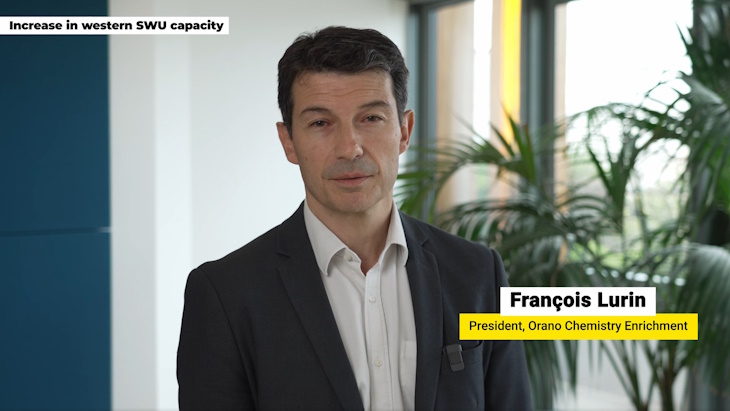
Lurin gave his update on Orano's enrichment plans in a video interview shared on the company's website and social media feeds
François Lurin, senior executive vice president of Orano's Chemistry-Enrichment Business Unit, set out the French fuel cycle company's enrichment plans in a video interview released to coincide with World Nuclear Symposium 2023.
The decision to extend capacity follows requests from some US and European customers who are seeking alternatives to Russian sources of supply, Lurin said: "We have been considering various options and we have concluded that the only way to supply additional needs was to build an extension to our existing capacities and the primary choice we would be able to make is to build up an extension on our Tricastin site at GB-II plant."
"We are happy to say that we would be able to start up production in 2028, with a ramp- up over two to three years up to a nominal production in 2030. Obviously this is subject to the final approval of the board and also to receiving firm orders from our customers given the magnitude of the investment," he said, adding that the company is "pretty confident" that approval will be given soon.
Customers have also approached Orano about supplying higher enrichment assays, Lurin said. Known as LEU+, this material is enriched to 5-8% uranium-235. "The first step is going from 5 to 6%," he said. "We have initiated the regulatory process to obtain approval to do this. We should be able to provide higher enrichment essays up to 6% by 2025."
Increasing assays from 6 to 8% will require further investment in the GB-II plant, which Lurin said the company will launch once it obtains "firm commitments" from customers. The regulatory process will take up to three years, he added.
Orano "should be able" to provide the various forms of enriched uranium to supply the different small modular reactor and advanced reactor technologies that are being developed, Lurin said. The company can produce the high-assay low-enriched uranium - also known as HALEU - that these reactors will need either by enrichment at its existing facilities, or by deconversion of uranium hexafluoride.
"We have also in the past had capacities and equipments to provide such material, so we know how to do it," Lurin said. "We are ready to invest but we need firm commitments from our customers or additional funding from other parties to do so and to launch these investments."
The GB-II centrifuge enrichment plant - which superseded the Georges Besse I gaseous diffusion enrichment plant - was officially opened in December 2010 and began commercial operation in April 2011. The French National Commission for Public Debate last year announced the relaunch of a consultation to consider increasing GB-II's capacity from 7.5 to 11 million SWU per year through addition of four natural uranium enrichment cascades at an estimated cost of some EUR 1.3 billion (USD970 million).
Niger update
In a separate announcement released on the same day as Lurin's interview, Orano said its local teams were working to ensure the continuity of activities at its sites in Niger. This follows the coup which took place in July.
"Given the ongoing closure of Niger's main supply corridor and diminishing stocks of chemical products, the SOMAÏR site has implemented a gradual reorganisation of work by bringing forward its maintenance activities," the company said.
"These measures will mitigate the impact of logistical difficulties and enable production to resume under optimum conditions as soon as the situation permits."
Orano's other projects in Niger - the remediation project at the COMINAK mine, which closed in 2021, and studies and activities at the Imouraren project - are continuing, the company said.
Niger produced 2,020 tU in 2022 - all from SOMAÏR - according to figures from World Nuclear Association. This makes the mine, at Arlit, the world's seventh largest in terms of uranium production in 2022.